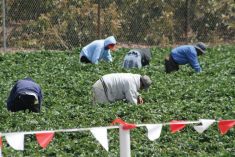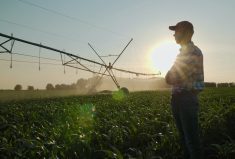You wake up in the morning and drink coffee before starting the work day. You turn on the TV and listen to a long list of deaths and destruction that happened in your country overnight.
The announcer speaks almost without emotion, as if he is talking about everyday, ordinary things.
You hear that 10 missiles fell on one big city, seven on another city, and dozens of small towns were hit by various attacks. One of the rockets hit a large residential building and killed and injured dozens of people. Another destroyed a power plant, a factory and a grain elevator.
Read Also

Beware giving horses too much iron
Horses consuming too much iron through diet or well water risk health problems like laminitis. Mineral testing forage and water is good practice for owners.
This is our traditional news package — yesterday, today, tomorrow.
This is how the morning begins for Ukrainians. After a long period of stress and emotion comes a cold awareness of the situation. We live with this war and we have almost forgotten what it was like before.
I recently spoke with a farmer, Serhii, who works 30 kilometres from the front line. I felt it was very difficult for this person, but the man was constantly joking and looked at his life with optimism.
Serhii said explosions are heard in their village several times a day — shells, rockets and drones fly toward them. Every person here is literally on the brink of death.
However, people try to live normal lives. They work, celebrate holidays and repair their houses. They explain their fearlessness simply: you will not be able to hide all your life. You need to live here and now.
Serhii is engaged in expanding his farm, investing money in its cultivation and in agricultural machinery and wants to install an irrigation system.
To be honest, I sometimes wonder why we continue to live and work, how we have electricity, gas and water in our houses, how vital services like banks, hospitals and schools work flawlessly. This isn’t true everywhere, but even in regions close to the front, you may not notice that war is nearby.
I can only explain this by the impressive ability of my fellow citizens to adapt to living conditions and improve all processes. We live in a large hive, in which live millions of hardworking bees that help each other.
As I wrote in an earlier article, every Ukrainian tries to turn their home into a Robinson Crusoe island. We grow our own food, stock up, have our own wells and collect firewood. Many houses have their own electric generators or solar batteries.
Therefore, most families can live for a long time without public interaction, but you could never survive without the support of other people.
Specialists live in every house on my street. My immediate neighbour is a tractor operator with his own tractor. There’s a welder, an electrician, a carpenter, a plumber, a builder and a gas heating repair specialist nearby. I can go on and on with this list. Many Ukrainians have several practical professions and this helps them and other people a lot.
If I need to plow my field near the house, I turn to one of the neighbours who has his own mini tractor. If my gas heating breaks down, I don’t look for a government agency or a large company. I go to a local handyman. If my car breaks down, dozens of small workshops and home mechanics throughout the town are at my service.
These people will do everything faster, cheaper and will be happy about new earnings. There are hundreds of thousands of such specialists throughout Ukraine, and thanks to this, you can sow your field or repair your car even during the war.
This also applies to farmers. In all regions of the country, there are many large and small repair shops and companies engaged in the supply of spare parts, pesticides and fertilizers. Their owners go out of their way to meet every customer and sometimes produce miracles.
In the first months of the war, when there was an acute shortage of fuel and other resources for work, these “bees” quickly established supply chains from European Union countries. More cargo began to travel across the border and the problem was overcome.
Specialists of service companies were not afraid to go to customers who worked near the front line. Sometimes tractors and combines were repaired in the field amid the sound of shelling. And even under such conditions, there was fierce competition between dealers. Each wanted to prove he could do the most to help his customers.
In all this, we are helped by two convenient industries that Ukraine can be proud of: logistics and banking. They have also improved in tough competition and there are few countries in the world that can boast of a similar service.
Although we don’t really like bankers, we give credit to them for their service. For example, you can get a payment or credit card at the bank in 10 or 15 minutes. No need to wait for weeks.
If you want to send money to another person, it takes a few seconds. Thanks to this, it is very convenient and simple to sell goods on the internet, including for farmers.
During the entire war, we had only a couple of problems in the payment banking system, and these were quickly eliminated. Believe me, in times of war, it is psychologically supportive — the certainty that you can dispose of your own funds at any time or automatically borrow a certain amount from the bank to buy fuel or medicine.
Another advantage is the ability to send any item throughout Ukraine quickly, conveniently and inexpensively, including cities and villages located near the front line. It takes just a day or two, in most cases, and is also very helpful for small business and military support.
These things open great possibilities for coordinating the efforts of millions of people, for survival in war conditions and for supporting the army.
The entrepreneurial abilities of Ukrainians and our ability to adapt to difficult situations provides powerful support for the army. Every day, hundreds of thousands of people across the country collect a small piece of aid that goes to the front or is given to refugees.
Someone gives a few dollars for these needs, others several thousand dollars. Product sellers provide important necessities — bottled water or instant coffee, soap, toothpaste or sanitary napkins. If someone has no money, he gives a bag of potatoes or several cans of vegetables.
Such a common cause and natural interaction between people who mostly do not know each other forms a powerful flow of support, without which we would never have stood against such a strong enemy.
The real strength of society is not one big centre but millions of little cells, just like bees in a hive, each doing its little part of the work. Despite everything, our great common hive resists the terrible storm, although every day it becomes more difficult to do so.
Unfortunately, we are in dire need of weapons and ammunition. Our lives literally depend on it. Every moment, Ukraine asks Western countries for new supplies of missiles and shells in order to protect its peaceful people from the threat.
We see that only some countries — and Canada is one of them — are not afraid to help us. Leaders of other countries close their eyes and think this danger will not affect them.
Believe me, if the aggressors are not stopped now, they will become stronger later.















